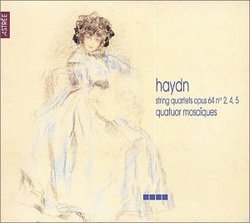| All Artists: Franz Joseph Haydn, Erich Hobarth, Mosaïques Quartet, Christophe Coin, Andrea Bischof, Anita Mitterer Title: Haydn: String Quartets Op 64 Nos 2, 4, 5 /Quatuor Mosaiques Members Wishing: 0 Total Copies: 0 Label: Astree Release Date: 8/13/2002 Genre: Classical Styles: Chamber Music, Historical Periods, Classical (c.1770-1830) Number of Discs: 1 SwapaCD Credits: 1 UPC: 822186088753 |
Search - Franz Joseph Haydn, Erich Hobarth, Mosaïques Quartet :: Haydn: String Quartets Op 64 Nos 2, 4, 5 /Quatuor Mosaiques
 | Franz Joseph Haydn, Erich Hobarth, Mosaïques Quartet Haydn: String Quartets Op 64 Nos 2, 4, 5 /Quatuor Mosaiques Genre: Classical |
Larger Image |
CD Details |
CD ReviewsAnother fine addition to the Mosaiques' Haydn Alan Lekan | Boulder, CO | 06/15/2005 (4 out of 5 stars) "In the early 1790's and after nearly 30 years of serving the aristocracy at Esterhazy court, Haydn was growing a bit weary and ready to finally venture out on his own as something of a freelance musician. But before this shift - which resulted in his first London visit (and magnificant symphonies) - he wrote these last quartets at Esterhazy and cataloged them under Op. 64. They were most likely written for one of the top violinists in the orchestra there and show an ever-deepening maturity in composition. The latter quartets here appear to look ahead towards performance before larger London audiences with their dramatic endings and emphasised virtuostic style. They all are among the "Top 30" quartets of Haydn today and part of the popular concert repertoire. The Austrian (not French) quartet, Quatuor Mosaiques, has received excellent reviews for their dynamic, probing readings of Haydn's quartets (Op. 20, 33, 64, 76 and 77). Gramophone recommends them across the board while ClassicsToday gave this set a perfect 10/10 for Artistic quality/Sound quality. All the Mosaiques' Haydn on Astree is recorded in vivid DDD sound and is among the best sound for these works in which you can clearly hear the nuances of each instrument voicing. This CD here represents half of the six Op. 64 quartets is yet another exciting recording for music lovers who prefer their Haydn quartets served up with some "edge" on period instruments that the Mosaiques are famous for doing. The Mosaiques approach to this music is gutsy and dramatic, featuring robust dynamics ... surging & attacking rhythms ... and sudden and amazingly uniform shifts in tempo and dynamics. Additionally, they bring a wonderfully delicate shading of tone and often evocative harmonies that animates these pieces that makes them one of the finest period quartets of all times. With such a style, the Mosaiques capture best Haydn's more serious, strange and dramatic moments but without losing the beautiful cantible lines of the slow movements or the playful attitudes in the scherzo movements. So, overall, this is another fine addition to their Haydn survey, but unfortunately only half of the Op. 64. Another enjoyable reading of Op. 64 in good sound quality comes from the Kodaly Quartet on Naxos. Using modern instruments, the Kodaly imparts a lush, smooth and fluid texture to the lyrical movements (like the fast movements in No. 2) that has a different appeal than the Mosaiques's often more punctuated dynamic quality. But, each has its own style with one not necessarily being better than another. Either quartet would be an excellent choice for Op. 64. " The Standard in period-instrument Viennese Classical recordi noeton | Pennsylvania | 11/18/2009 (5 out of 5 stars) "All Quatuor Mosaiques' Hadyn recordings are first rate and have garnered wide critical acclaim. Of other recent artists' offering of the Haydn quartets, the Lindsays stand next to Mosaiques. However, the differences in style and interpretation are notable. Mosaiques is a period ensemble, with a more delicate sound. The Lindsays make an excellent case for a more robust approach. To choose between them on sheer quality is impossible, and one may only follow one's personal preferences or enjoy both depending on mood. If forced by frugality, one cannot go wrong with either. At the same time, this reviewer cannot resist claiming that the Mosaiques have a very special attunement to what must be most properly 'Haydn.'
The previous reviewer mentions the Kodaly offering on Naxos. A decade ago this label was putting out some nice discs and some, frankly, cruddy ones. Yet today Naxos has truly become THE budget label and for this is to be commended. They can, naturally, be hit and miss. However, my own rule of thumb is that one rarely goes wrong with their chamber music selections. Many of them are even considerably better than their regular-price counterparts and they even put out wonderful material overlooked by big labels and hence to which there simply is no counterpart: here their guitar and lute offerings are paradigm. Certainly, given their prices, even with the occasional sub-satisfactory disc (my own experience, maybe 3-5%?) one can never say they've any right to feel "gypped." I have listened to the Kodaly and indeed agree with the previous reviewer's assessment and terms. But I must stick to my guns and say, if you have the money, the Mosaiques are worth it because they are better - more pizazz without the least sacrifice of sensitivity. They are, again, also period performers, and this can alone make them preferable, given one's taste. I hence part at this juncture from the previous reviewer's opinion by suggesting the true alternative is between the Kodaly Quartet and the Lindsays: on modern instruments I find the latter have the upper hand, but they also cost substantially more per disc. And that's how it is. (Of course, you can always become a fanatic like me and buy them all!)" |
